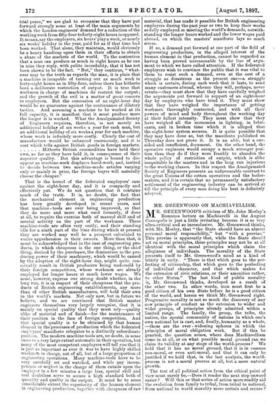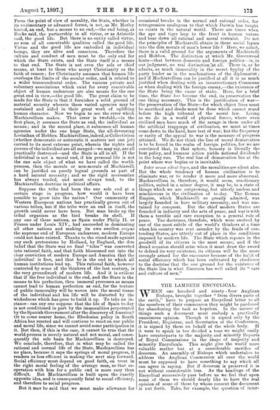MR. GREENWOOD ON MACHIAVELLISM.
MR. GREENWOOD'S criticism of Mr. John Morley's Romanes lecture on Machiavelli in the August Cosinopolis is just a little irritating because it is so very ultra-critical and so inconclusive. Mr. Greenwood thinks, with Mr. Morley, that "the State should have an almost personal moral responsibility," but "with a proviso." This proviso is apparently that, while the State should act on moral principles, these principles may not be at all identical with the moral principles which claim the allegiance of individuals. The morality of the State presents itself to Mr. Greenwood's mind as a kind of trinity in unity. "There is that which goes to the per- fecting of citizenship, that which goes to the perfecting of individual character, and that which makes for the extension of civic relations, or their amenities rather, to other States." The last kind of public morality is, Mr. Greenwood thinks, developed as a result of the other two. In other words, man must first be a good citizen of his own State before he is a good citizen of the world, and herein we think Mr. Greenwood right. Progressive morality is not so much the discovery of any new principle of conduct as the extension to wider and wider groups, of principles already admitted within a limited range. The family, the group, the tribe, the nation, the special community of nations in which one's own national lot is cast, and, finally, humanity as a whole, —these are the ever - widening spheres in which the principles of moral obligation work. But if this be granted, the question arises, where does Machiavellism come in at all, or on what possible moral ground can we claim its validity at any stage of the world-process ? We hold that it has no moral ground, that it is in essence non-moral, or even anti-moral, and that it can only be justified if we hold that, in the last analysis, the world- process is not a moral process at all, but a mere natural growth.
The test of all political action from the ethical point of view must surely be,—Does it render the next step onward easier ? Will this or that series of action more readily aid the evolution from family to tribal, from tribal to national, from national to world morality more certain and secure ? From the point of view of morality, the State, whether in its rudimentary or advanced forms, is not, as Mr. Morley hinted, an end, but a means to an end,—the end being, as Burke said, the partnership in all virtue, or as Aristotle said, the good life. But there is no entity called virtue, no sum of all conceivable qualities called the good life. Virtue and the good life are embodied in individual beings, they are alive and. conscious. Therefore the culture and conduct of men must be the only end for which the State exists, and the State itself is a means to that end. The State is not even the sole or chief means, at least to those who accept Christianity as the faith of reason ; for Christianity assumes that human life overleaps the limits of the secular order, and is related to a wider transcendental order. The various private and voluntary associations which exist for every conceivable object of human endeavour are also means for the one great end in view,—the good life. The great claim to be made for the State is that it furnishes a solid ground of material security wherein these varied agencies may be sustained and aided in their great work of uplifting human character. Now we begin to see the error which Machiavellism makes. That error is twofold,—in the first place, it assumes the State as end, the individual as means ; and in the second place, it subsumes all human agencies under the one huge State, the all-devouring Leviathan of Hobbes. Machiavellism,indeed,is Collectivism (whether democratic or autocratic it matters not one jot) carried to its most extreme point, wherein the rights and powers of the individual are all merged—we may say, are all practically destroyed—and the State is all in all. If the individual is not a moral end, if his personal life is not the one sole object of what we have called the world- process, then the morals or non-morals of Machiavelli can be justified on purely logical grounds as part of a hard natural necessity ; and so the rigid necessarian has always tended, and must always tend, to the Machiavellian doctrine in political affairs.
Suppose the tribe had been the one sole end at a certain stage in progress, how would it have been possible to grow into the nation ? Our community of Western European nations has practically grown out of various tribes, but if the tribe were an end in itself, the growth could never have been. But man broke up the tribal organism as the bird breaks its shell. If any one of these nations, as Spain under Philip II. or France under Louis XIV., had succeeded in dominating all other nations and making its own swollen corpus the supreme end of European endeavour, modern Europe could not have existed. Thanks to the stand made against any such pretensions by Holland, by England, the dim belief that the State was no final " telos " was converted into rational faith, and that faith blossomed out into the clear conviction of modern Europe and America that the individual is free, and that he is the end to which all human institutions lead up. This rational faith, however contorted by some of the thinkers of the last century, is the very groundwork of modern life. And it is evident that if the free individual is the end, and the State is the means to his perfection, then immoral processes as means cannot lead to human perfection as end, for the texture of public immorality will be woven into the moral tissue of the individual and his life will be distorted by the wickedness which has gone to build it up. To take an in- stance : can any one suppose that the life of Spain to-day is not conditioned in part by the immoralities perpetrated by the Spanish Government after the discovery of America? Or to come nearer home, the Rhodesian policy in South Africa has reacted and will continue to react on our public and moral life, since we cannot avoid some participation in it. But then, if this is the case, it cannot be true that the world-process is merely natural and not moral, and conse- quently the sole basis for Machiavellism is destroyed. We conclude, therefore, that in what may be called the rational and normal life of the State, Machiavellism has no place, because it saps the springs of moral progress, it renders us less efficient in making the next step forward. Social efficiency must depend on good faith, on trust in the right moral feeling of the average man, so that co- operation with him for a public end is more easy than difficult. But Machiavellism is built upon the exactly opposite idea, and is consequently fatal to social efficiency, and therefore to social progress.
But it may be said that we must make allowance for occasional breaks in the normal and rational order, for retrogression analogous to that which Darwin has taught us exists in the natural world. There are times when the ape and tiger leap to the front in human nature and bear down all rational and moral restraint. Do not the principles of Machiavelli obtain in these social lapses into the dim morals of man's lower life ? Here, we admit, there is a, valid ground for the arguments of Machiavelli and Hobbes. The distinction at which Mr. Greenwood hints—that between domestic and foreign politics—is, in our judgment, no real distinction at all. There is, as he admits, as much immorality in the secret byplay of the party leader as in the machinations of the diplomatist ; and if Machiavellism can be justified at all it is as much justified when dealing with an insurrectionary Commune as when dealing with the foreign enemy,—the existence of the State being the cause at stake. Here, for a brief time, the State has become the end, its preservation the one thing necessary. This is the justification of war— the preservation of the State—for which object lives must be sacrificed and deeds must be done which cannot stand before the high tribunal of the moral law. Living as we do in a world of physical forces, where even civilised men have much of the savage in them under all the artificial trappings of civilisation, we must at times come down to the hard, bare test of war; but the frequency or rarity of the appeal to war is the measure of progress attained. We do not think the line of moral demarcation is to be found in the realm of foreign politics, for we are convinced that, in that sphere, honesty is literally the beat policy, and humane action yields national dividends in the long run. The real line of demarcation lies at the point where war begins or is inevitable.
Inter arnta silent leges, and the moralities are silent also. But the whole tendency of human civilisation is to eliminate war, or to render it more and more abnormal. Machiavellism is, therefore, it would seem, reactionary politics, suited in a minor degree, it may be, to a state of things which we are outgrowing, but utterly useless and mischievous in the civilisation of to-day. The Roman Empire, which Machiavelli so greatly admired, was largely founded in bare military necessity, and was sus- tained by conquest. But the chief modern States are founded in industry and the arts of peace, and war is with them a terrible and rare exception to a general rule of peace. Tne doctrines, therefore, which were evolved by one of the most subtle of the world's thinkers at a time when his country was rent asunder by the feuds of con- tending States, are utterly out of place in the conditions imposed by modern life. The State which reposes in the goodwill of its citizens is the most secure, and if the dread occasion should arise when it must draw the sword to defend its very existence, its citizens will be the more strongly armed for the encounter because of the habit of social efficiency which has been cultivated by obedience to the doctrine that the one ground for the existence of the State lies in what Emerson has well called its " care and culture of men."



































 Previous page
Previous page